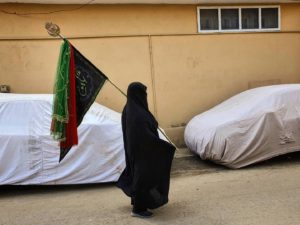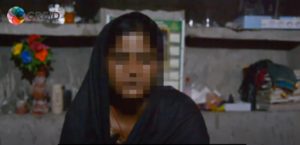Asad Gokal

The Shia women were beaten by batons and dragged by the Narowal police which had raided their homes to arrest their men for participating in the Chehlum procession.
A terrifying October night
“It was around 12.30 in the night when they jumped inside my house. A boot landed right onto my son’s face, who was sleeping, and it broke his nose. They started dragging my husband out of the house and when I tried to stop, I was beaten with batons”, spoke Fatima Kauser, who was one among the many Shia women brutally beaten by the Punjab Police officials during the raid carried out in Narowal.
P.
Peaceful processions were taken out across the country to commemorate the 40th day (Arbaeen) of Imam Hussain’s martyrdom. The main procession of Narowal was taken out by the permit-holder, who had the NOC. But smaller rallies, joining from the villages in the outskirts, were not licensed.
The Police tried to book them on this pretext and lodged FIRs against 17 men in the religious rally, under the Loudspeaker act. The next night officials cordoned off the area and conducted raids on the Shia families as per the orders of DPO Narowal Zulfiqar Ahmad.
“What did we do to deserve such inhumane treatment?”, Fatima breaks into tears asking if “it is a crime to participate in the Shia processions in Pakistan”. The freedom of practicing religion is a constitutional right and booking members of religious minorities for peaceful processions is questionable itself.

There was no police lady constable during these raids. The men were arrested and women manhandled, harassed, and illegally abducted. Even children were not spared from the beating by the Police and were heard wailing in the neighborhoods.
Shia women of Narowal share their ordeal
“It was a horrendous night for us, the police officials had surrounded the entire area from 12 am to 2 am and six of them climbed inside my house. After attacking me with a baton, the police made derogatory remarks about me and swore at me in front of my children who were extremely terrified watching all of it”, Kauser shared her experience.
The villagers applied for writ the next morning in the court which forced the police to release the illegally abducted women after 8 hours.
Twelve of these men are still behind the bars facing non-bailable offenses registered against them. We have learned that the detained men face quite a lot of difficulty in sitting down in the jail due to the brutal torture done during the raid. They have not been granted permission for a medical checkup inside the jail.
“Weeks have passed since the incident, yet the bruises on my body have still not healed. I still limp whenever I try to walk”, recalled Sakina, another woman of the village who was harassed and kicked by the police officials when she tried to stop them from arresting her husband.
Zehra, 40, broke into tears on the phone call “Not only did they violently hit me with the baton but they pulled my veil away from my head and the manhandling tore my clothes. How is this not a blatant human rights violation?”
The harsh treatment of the Punjab police did not spare pregnant women. “At least they could have some consideration for the unborn child inside of me before kicking me so ferociously. Since the day the police raided our area, I am in indescribably intense pain and my tears do not stop flowing”, said Sughra, a pregnant woman, manhandled and harassed by the police during the raid.
Ruqaiyya expressed concern about her two sons. “One of them was detained by the Police while the other escaped the village during the raid and still hasn’t returned”, she said.
The children who saw their parents assaulted in such a crude manner have been traumatized to the level that they have trouble falling asleep at night. One of the mothers mentioned how the kids shake with terror if they see a man in a police uniform walk nearby.

DPO Zulfiqar Ahmed, known for his cruel way of dealing
The entire raid operation was executed by SHO Narowal Riaz Taseer Cheema on the direct instructions from DPO Zulfiqar Ahmed. The latter man has a history of being in the headlines for the wrong reasons. In 2018, Zulfiqar Ahmed was sacked from his post as DPO Kasur after Kasur police had opened fire on protesters demanding immediate arrest of rapist and killer of seven-year-old Zainab. It was done under his command.
The firing led to the death of two protestors and a few being critically injured. Later that year, he was given a clean chit and appointed as DPO Chiniot. In fact, he has been transferred again this week, to the Sargodha office.
Aimen, 19, explained how unsafe she feels living in her home with no gate. “The police have broken down the gate of my place and since my husband is behind the bars, I feel vulnerable living in my home with my daughter” Aimen speaks of her fear “whenever a man walks down the street, we frantically rush to check our locks for the fear of an assault”.
The residents raised voice against the inhumane behavior of the police officials, and the SHO was suspended but the DPO, on whose order the entire operation was carried out, does not have to bear the brunt.
The bread earners of the Narowal families are detained in jail, their wives and children suffer at homes with inadequate supplies of daily necessities. The legal, medical, and household expenses become unimaginably difficult for poor families to bear. No condemnation of such blatant human rights violations by the government representatives adds to the agony of the persecuted Shia families.
Pseudonyms have been used to protect identities.



